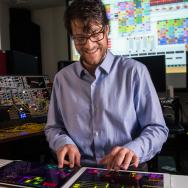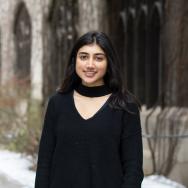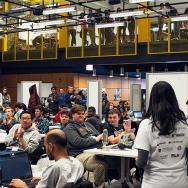Editor’s note: This story is part of ‘Meet a UChicagoan,’ a regular series focusing on the people who make UChicago a distinct intellectual community. Read about the others here.
Devshi Mehrotra doesn’t aspire to design the next big app or social platform. Instead, she wants to leverage technology to tackle issues ranging from criminal justice reform to income inequality, while inspiring communities around the world to do the same.
“The set of priorities that drive technological research and innovation today are not inclusive of the challenges facing large parts of society, especially not racial minorities and low-income communities,” said Mehrotra, who graduated in June from the University of Chicago with a joint bachelor’s and master’s in computer science. “I see computer science education as a tool to encourage individuals from diverse backgrounds to draw from their unique set of experiences in building products that uplift the communities they personally care about.”
Mehrotra is spending the summer as a researcher at Stanford Law School working with artificial intelligence—technology she will continue to explore this fall as part of a master’s program at Tsinghua University in Beijing, one of the world’s most renowned institutions of technology.
It is Mehrotra’s transformative experience at UChicago that inspired much of her ambitious career path. While a student in the College, Mehrotra led an organization called compileHer, which is dedicated to computer science education for young girls, particularly those of color. The group teaches an after-school tech curriculum in Chicago schools, including lessons on robotics, virtual reality, coding and drones.
This past winter, compileHer hosted a hackathon-style event that coached middle school girls to design and develop a problem-solving mobile app. These young students used their new skills for deeply personal and community-oriented goals, from improving the self-esteem of their peers to creating more accessible technology for their grandparents. Goals like these, according to Mehrotra, aren’t always prioritized by the tech industry.
“The reason that technology is such a powerful tool is that it enables people to directly build the change they want to see in the world,” Mehrotra said. “Young women, and especially young women of color, may not necessarily see their dreams being reflected in the products being built by the technology industry today. We wanted to bridge the gap between the problems our students want to tackle and the technology that can help them achieve their goals.”
Supporting the Chicago community
In addition to creating a community of young computer scientists outside of UChicago, compileHer fostered a network of students within the College. Mehrotra describes the women who founded compileHer as some of her primary role models when she decided to pursue her interest in computer science and public service.
With the support of this community, Mehrotra and fellow computer science major Leslie Jones-Dove, AB’19, began a project with the Cook County Public Defender’s Office that sought to improve the work of public defenders.
“The course was very open-ended. We got together in groups and were basically told: ‘Build something,’” Mehrotra said of the project, part of a graduate-level computer science course. “I came into it with a very clear sense of wanting to leverage my technical background to support criminal justice reform efforts in the city of Chicago.”
The pair created a video transcription service and evidence management tool to assist the often under-resourced and over-worked attorneys. Since then, they’ve formed a company called JusticeText, completed a pilot study and received interest from public defender’s offices across the country.
Mehrotra was thrilled to see that she could make an impact with her work. This project was part of her ongoing efforts to unite her academic pursuits with public-oriented goals. As a leader at UChicago’s Institute of Politics, she met with activists and developed an understanding of how her computer science expertise could meet a community need.
“It’s important for me to make sure all the work I’m doing as a student is informed by experiences I’m having outside the classroom,” she said. “I think that being engaged with the city of Chicago and being on campus allowed me to immerse myself in conversations centered on justice before addressing them from an academic angle. I’m going to do my best to carve out those conversations, wherever I am.”
Global perspectives
Mehrotra’s time on the UChicago campus provided an opportunity for many of those kinds of conversations. She credited a Civilizations sequence as one of the most transformative courses in her College experience.
“That was the first time that I got to read about academics and scholars and activists of color, particularly from India,” said Mehrotra. “It was empowering to learn about the ways in which these scholars transformed their experiences with trauma into work that redefined our conceptions of race, gender and society. The course really affirmed to me that this work is just as legitimate in an academic space as the philosophies of those who, for example, forged the principles underpinning our Constitution.”
In addition to her studies, Mehrotra completed internships with leading institutions in artificial intelligence, including Google Brain, Microsoft Research, Google DeepMind, Facebook and Peking University. This summer, she is continuing her research efforts at Stanford Law School, where her lab investigates means of leveraging AI technology to support federal agencies. She has experience applying deep learning algorithms to predict the progression of retinal diseases, perform natural language processing, and train robotic agents. All have the potential to bring dramatic improvement to public health in the coming years.
This fall, she will begin a one-year master’s program in global affairs through the Schwarzman Scholars program. Studying at Tsinghua University, she will build her experience as an AI researcher while studying in Beijing, home to a vibrant ecosystem of machine learning startups. Ultimately, Mehrotra hopes to promote inclusion in AI technology and continue her efforts to support criminal justice reform around the world.
“I would like to dedicate my life toward finding ways technology can be leveraged as a means to equalize opportunity for those who are most underserved,” Mehrotra said.
Her time at UChicago, she said, helped her approach these new experiences with a willingness to take risks and a confidence in her vision.
“I realized the education I’ve received so far has prepared me to step up to any challenge and make meaningful impact. I might be 21 and have just recently graduated, but if I just take the initiative, there’s so much that I can do.”



